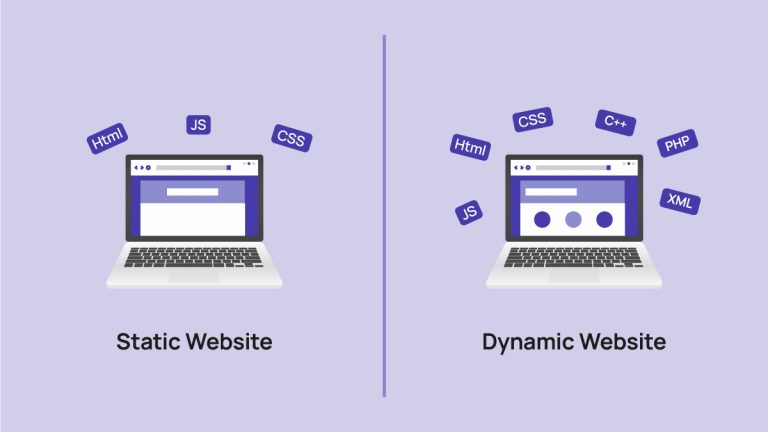Building an online business evidently requires a strong command of the web. But even for a brick-and-mortar business, nowadays, a web presence is a necessity. There are a lot of errands you need to cover to achieve so. The first stepping stone is, however, creating a stable webpage dedicated to your business.
Thanks to the ever-growing online business market, there are a lot of options available on the internet. They allow you to create your own website with minimal resources. But unfortunately, things are not quite as simple as that. With the implementation of a webpage for representational purposes, there are generally a lot of other things to consider. Choosing between static vs dynamic websites is the most important of them all.
As of now, coders have granted us only two primary kinds- static and dynamic web pages. Both of the mentioned have their own advantages and disadvantages. Hence, the only way to pick on one is by judging them according to how they are able to cater to your business’s individual needs. For the same, you will have to understand either of the mentioned kinds individually. And for that, you have landed at the right place already. Scroll down to achieve the ability to take your pick.
Launch your business online with Exly’s free professional tools!
Why Do You Need a Website At All?

When you are building a business from scratch, there will be a lot of stuff on your checklist that you need to tick off. Moreover, if it isn’t an online business, creating a webpage for a brand portfolio might move a lot down the list. On the other hand, if your business is reasonably successful, you might as well question the effectiveness of a website to make that big of a difference from your traditional ways.
The most straightforward, rather the only possible response to that would be, now is the perfect time to invest in a professional webpage for your business for the most elementary reason of not losing business to your competitors that already have one. Apart from that, thanks to COVID-19, the post-pandemic world has altered the retail landscape to a great extent with the majority of consumers shifting from physical shopping to e-commerce for their regular as well as luxury needs. This has also created a new tendency among consumers to check the credibility of a particular brand online before investing in it through any mode.
Try creating your own website for free without coding!
Definition of Static vs Dynamic Website
Understanding the type of webpage your business needs is a task in itself and at times, your entire effort of creating a website completely depends on the mentioned choice. In order to play your cards right, you need to make sure to make a fair decision in this regard and that is where we come to your rescue! Scroll down to understand the prospects individually.
What is a Static Website?

Websites that contain a fixed number of web pages with fixed content and structure fall under the category of static websites. Convenient for developers and stationery for the viewers, these kinds of pages are generally designed for blog-based or informational content that does not require any updates. Users see identical content every time they view the page.
The programming language of HTML is used to set up the structure of the mentioned kind of pages and editions or changes can be made to the original content only by editing the source code. This feature adds up to the “static” nature of the pages. However, contrary to what static pages sound like, they are usually very convenient for developers and comparatively more budget-friendly as they do not require additional software or aids for building.
Here is a bundle of all the advantages of static websites so that you can determine their relevance to your business needs.
Advantages:
- Static websites are less time-consuming
- Static websites are also budget-friendly
- The content and information shared on static web pages are comparatively more protected and secure.
- Search engines are better adapted to static web pages
- You do not require any additional software for the development of static web pages
- Changes can be applied to the content of your static website by simply modifying the base code
- You can also copy the base code of a web page to keep the elements of the website uniform
- A static website can be anytime converted just by redeploying the codebase.
Types of static content:
- Online application/registration/case study forms
- Images
- Images
- Videos
- Audio files
- Documents
- Downloads
- HTML pages
- Cascading style sheets
- Fonts
- Javascript
Looking for a platform to launch your content? Exly got your back!
What is a dynamic website?

Websites that render dynamic web pages in real-time and provide interactive and changing elements fall under the category of a dynamic website. Moreover, A striking feature of such pages is that they develop and display content on the basis of past actions. In a way, such sites are more user-friendly and productive when it comes to business-client relationships. User actions are not only limited to viewing content according to their preferences but also pulling up data about their account. Moreover, the level of these changes that take place hinges on the developer’s skills.
Built on the language of PHP, C#, and Python, the development and editions of these pages are generally very flexible and customizable. The dynamic website demands pulling in content from an external database while the server-side code builds a dynamic website to generate real-time HTML pages.
Scroll down to explore the advantages of dynamic websites.
Advantages
- A dynamic website allows creators to store information. They can also display content in an organized manner
- These kinds of pages usually allow more user interaction and extra flexibility
- Users are shown content based on their past actions and individual requirements, hence, displaying content to a target audience
- Such websites can also be made to allow adjustments by the users.
- It is comparatively more likely for consumers to engage with dynamic websites, most of your favorite platforms like Twitter, Netflix, and many more are made of dynamic web pages
- Making changes as well as adjustments is inexpensive.
Types of dynamic content
- Video and voice messaging applications
- Text
- Real-time data
- Translated web pages
- Database
- User account info
Capture & Convert More Leads For Your Small Business With Exly!
Now that you have got a general understanding of the prospects of what is a static and dynamic website on an individual basis, here is a more intensive look at both kinds through a comparative lens that brings us to the segment of static vs dynamic websites and which one to choose for your business needs.
Static vs Dynamic Website
The most significant difference between static and dynamic websites is that of content behavior. The content on a static page does not change. Contrarily, a dynamic website allows content to change. Changes can be made according to how the creator wants it to behave. Also, businesses can drive customers to view content they wish for them to see.

Scroll down to learn the main differences between static and dynamic websites at a glance:
| STATIC WEBSITE | DYNAMIC WEBSITE |
| The content remains the same | The content changes |
| It is easier to store data | It is comparatively difficult to store data |
| The content comes from the server | The content must pass through various application logic layers |
| A user sees the exact same thing on each individual page | Content is pulled on-the-fly, allowing its content to change with the user. |
| Data is stored directly on the server and pulled as is | Data is stored in a database and delivered according to how it is filtered |
| Longer to launch initially but long-term management is efficient | Can be launched fast but requires more intensive management as they grow |
Static vs Dynamic Website: Which one to go for?
Both of the mentioned kinds of web pages have their own pros and cons. However, it is not very difficult to choose from them. If your website consists of rare pages and information that are for public access, a static webpage is a pick for you. A good candidate for a static site is a resume-building website. This is a type of site that doesn’t require many changes to individual pages, with set content for each page. Other examples of common static website types include personal websites and nonprofit websites. Another scenario is creating a static website for a landing page that contains basic information about your company and the services offered.
On the other hand, if your website deals with e-commerce or online forums and other similar actions, you would be better off with a dynamic website. dynamic websites offer a lot of options to the website owner as well as the user. Creators can make suggestions to users based on their past purchases and view their content according to your demand, In a nutshell, dynamic sites are the solution for those sites that are content-heavy and user-driven.
Use Exly’s free website creating feature to never face performance issues with dynamic pages again!
Building a Website with Exly

With a website builder like Exly, creators get the freedom to create their own websites. They can do so without having to learn to code. Additionally, Our professional tools and features allow creators to conveniently create and edit content-heavy sites. They can turn default static pages into dynamic pages or create a hybrid version as well. Creators also get the additional advantage of designing their own site with our free tools. Hence, they can preserve their brand individuality in the ever-growing competitive marketplace.
Conclusion
- Why do you need a website for your business?
Now is the perfect time to invest in a professional webpage for your business. The most elementary reason is to not lose business to your competitors that already have one. Thanks to COVID-19, the post-pandemic world has consequently created a new tendency among consumers. They tend to check the credibility of a particular brand online before investing in it through any mode.
- What is a Static and dynamic website?
Websites that contain a fixed number of web pages with fixed content and structure are static websites.
Websites that render dynamic web pages in real-time and provide interactive and changing elements are dynamic websites.
- Static vs dynamic website
The content on a static page does not change. A dynamic website allows content to change. This is according to how the creator wants it to behave and what they desire for users to see.
- Static or dynamic website: which one to go for?
If your website consists of rare pages and information that are for public access, go for a static webpage.
If your website deals with e-commerce or online forums and other similar actions, you should go for a dynamic website.
How can Exly help you?
In competitive times like these, the workforce has shifted to a remote mode. As a result, there has been a rapid increase in content creators or online business owners. However, this development has cost the individuality and uniqueness of creators. This has resulted in a tendency of website building companies to own up the credibility of smaller businesses. But Exly comes to the rescue of such creators and offers 100% content ownership to their users free of charge.
Creators pay only when they earn themselves. They have complete freedom to enjoy all the professional analytical tools and services at no additional cost. Over 20,000 creators as well as business owners have already joined the team. As a result, Exly has been polled as one of the favorite platforms for businesses. So what are you waiting for? Join us now to see your business reach places!





